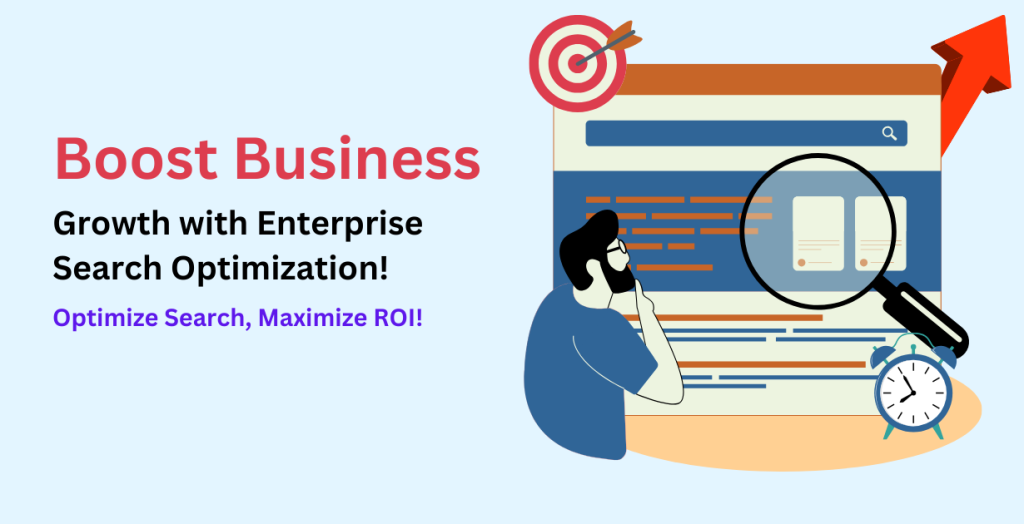
In today’s digital world, businesses face a huge challenge: how to quickly and efficiently find the information they need to make the right decisions. Whether it’s a product, a report, or any other type of data, getting access to the right information at the right time can make all the difference in achieving business success. However, many organizations are still struggling with inefficient search systems. This leads to time wasted, frustrated employees, and lost business opportunities.
The truth is, poor search strategies can directly affect your bottom line. That’s where enterprise search optimization comes into play. In this blog, we’ll walk you through why optimized search strategies are so important, how they work, and how they can boost your ROI. Let’s dive in!
Table of Contents
- Enterprise Search Optimization: How It Enhances Search Efficiency
- Why Business Search Strategies Fail – And What’s Missing
- What’s The Need for Optimized Enterprise Search?
- What Makes a Search Strategy Effective? A Detailed Breakdown
- How Search Optimization Directly Impacts Your Revenue & ROI
- Solutions to Optimize Search for Different Website Types
- Best Tools & Technologies for Implementing Optimized Search Strategies
- Conclusion
Enterprise Search Optimization: How It Enhances Search Efficiency
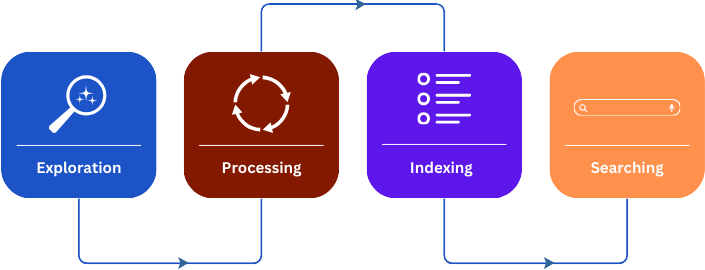
What is Enterprise Search Optimization?
Enterprise search optimization is all about improving how your business searches for and accesses information. It’s not just about using a basic search bar on your website or internal systems — it’s about optimizing the entire search process to ensure that your team or customers can quickly find the most relevant and accurate information, no matter how much data you have or how complex your needs are.
How Does It Work?
Here’s a simple breakdown of how enterprise search optimization works:
- Data Indexing: This means organizing all of your data (whether it’s documents, products, or customer data) in a way that makes it easy to retrieve. For example, if you’re running an e-commerce site, indexing helps your system know where each product is stored so that users can find it instantly when they search.
- Semantic Search: Instead of just looking for exact matches of search terms, semantic search understands the meaning behind the words. Let’s say a customer types “best summer shoes” into your site. A traditional search might just return shoes with the words “summer” or “best.” With semantic search, it can understand the intent and show the best shoes for summer based on product features, reviews, and more.
- Personalization: Not all users are the same, so why should they see the same results? Personalization tailors search results to each user based on their past behavior or preferences. For instance, if a customer has bought running shoes before, your search engine can prioritize athletic footwear when they search for shoes again.
- AI and Machine Learning: Over time, AI and machine learning help refine the search process by learning from user behavior and improving the search results. This is like your system becoming smarter with each search query.
- Advanced Filtering and Ranking: This feature enables users to filter search results according to particular standards, such as price, rating, or product category. It helps to cut through the noise and focus on what’s most important.
Ultimately, enterprise search optimization is about making it easier for users to find what they need, when they need it, which improves both customer satisfaction and decision-making.
Why Business Search Strategies Fail – And What’s Missing
Now that we understand what enterprise search optimization is, let’s take a look at why it matters. The problem with many businesses today is that they don’t have an optimized search strategy. This leads to inefficiencies, missed opportunities, and frustration — especially for decision-makers.
An unoptimized enterprise search leads to frustration, inefficiency, and financial losses. Whether your customers can’t find the right product on your website, or your employees struggle to retrieve important documents, the consequences can be severe.
Common Search-Related Problems Across Business Websites
Each type of website faces unique challenges when it comes to search optimization. Let’s look at some real-world scenarios where poor search functionalities negatively impact businesses:
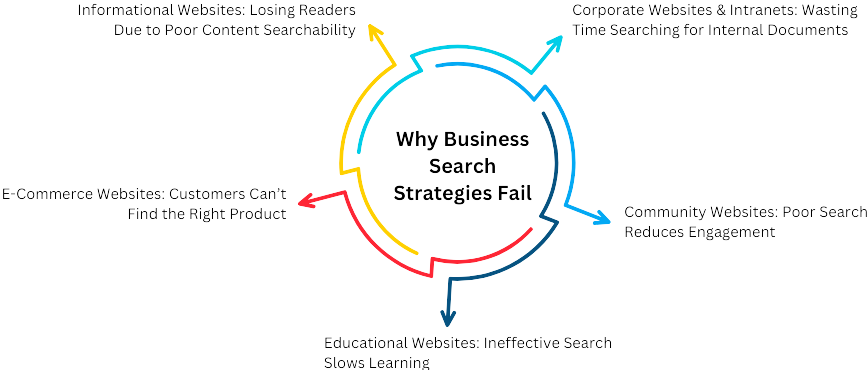
1. Informational Websites: Losing Readers Due to Poor Content Searchability
Businesses that rely on informational content—like news portals, industry blogs, or research websites—need a powerful search mechanism to ensure users can quickly find relevant articles or reports. However, many websites still use basic keyword-based search engines, which don’t consider context, intent, or user preference.
Example:
A user visits a tech news website to find the latest insights on AI-driven marketing strategies. They type “AI in marketing” in the search bar, but the search system only retrieves articles with the exact phrase, ignoring relevant content like “Artificial Intelligence for Advertising” or “Machine Learning in Digital Marketing.” As a result, the user leaves the site, increasing bounce rates.
The impact:
- Reduced engagement and website traffic.
- Poor user experiences leading to higher exit rates.
- Loss of potential ad revenue or conversions.
2. E-Commerce Websites: Customers Can’t Find the Right Product
For e-commerce businesses, search optimization is directly linked to sales and conversions. If customers can’t easily find what they’re looking for, they’ll leave and shop elsewhere. Many e-commerce platforms suffer from lack of proper indexing, irrelevant search results, and inefficient filters.
Example:
A shopper on an online store search for “men’s running shoes” but gets results showing general sneakers, women’s sports shoes, and unrelated items. The reason? The search engine only matches keywords instead of understanding product categories, user intent, and popularity.
The impact:
- Increased cart abandonment rates.
- Lower conversion rates and lost revenue.
- Poor customer experience, leading to reduced brand loyalty.
3. Corporate Websites & Intranets: Wasting Time Searching for Internal Documents
In large corporations, employees spend a significant amount of time searching for reports, policies, and documents. Without an efficient enterprise search engine optimization system, employees often struggle to find the right information.
Example:
A project manager in a multinational company is looking for last year’s financial report. The company’s internal document storage doesn’t have a structured search system, so the manager has to browse through dozens of irrelevant files before finding the right one.
The impact:
- Wasted employee hours, reducing productivity.
- Delayed decision-making, affecting business growth.
- Frustration among employees and loss of efficiency.
4. Community Websites: Poor Search Reduces Engagement
Online communities and forums rely on search functionalities to help users find discussions, posts, or shared resources. If the search tool is slow, inaccurate, or unresponsive, users will stop engaging.
Example:
A user on professional networking forum searches for “best tools for content marketing” but only finds old discussions from 2018, instead of the latest trends or tools. The outdated search results discourage participation, leading to low engagement.
The impact:
- Lower user retention and engagement.
- Users switching to competing platforms.
- Missed opportunities for community growth.
5. Educational Websites: Ineffective Search Slows Learning
For online learning platforms, universities, or digital libraries, students and educators rely on search engines to find courses, research materials, and assignments. If the search tool isn’t optimized, students may struggle to locate relevant resources.
Example:
A university’s online portal allows students to search for research papers. However, since the search engine only relies on exact keyword matches, students miss out on valuable but semantically relevant content.
The impact:
- Difficulty in accessing educational materials.
- Increased frustration among students and faculty.
- A negative reputation for the learning platform.
What’s The Need for Optimized Enterprise Search?
Now that we’ve established the problems caused by poor search functionality, the next question is: What makes a search system optimized?
An optimized enterprise search system ensures that users can find relevant information quickly and effortlessly, leading to better decision-making, higher engagement, and increased ROI.
What Sets Enterprise Search Apart from Basic Search?
A basic search system simply matches keywords from user queries with stored data, leading to irrelevant and inaccurate results. In contrast, an enterprise search optimization system is designed to:
- Understand intent, context, and user preferences.
- Deliver fast, precise, and organized search results.
- Continuously improve through AI and machine learning.
For businesses, this means:
- Higher efficiency in internal operations.
- Increased revenue for e-commerce platforms.
- Better engagement for informational and community websites.
How Enterprise Search Helps in Decision-Making
A well-optimized search strategy is not just about retrieving data — it’s about providing the right information at the right time. Here’s how:
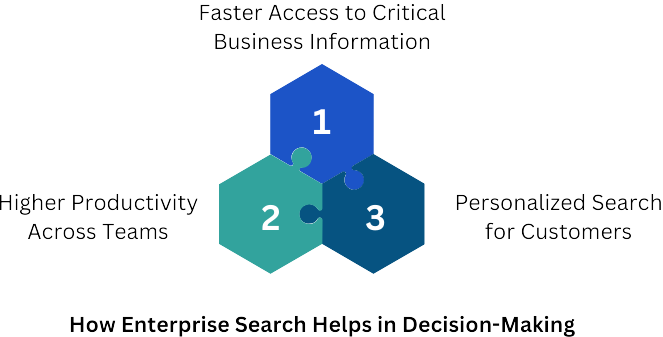
1. Faster Access to Critical Business Information
Decision-makers rely on quick, accurate data retrieval to respond to market trends, customer demands, and operational challenges.
Example:
A retail chain’s CEO needs to analyze last quarter’s sales data. Instead of manually searching through spreadsheets, an optimized search tool retrieves key reports in seconds, allowing for instant insights and strategic planning.
The result:
- Faster decision-making.
- Improved response to market trends.
- Better business agility.
2. Higher Productivity Across Teams
In large organizations, teams need to find internal documents, policies, and client records efficiently. Enterprise search optimization ensures seamless access to this data.
Example:
A customer service team needs quick access to FAQs and customer policies. An optimized search tool delivers instant results, reducing call resolution time and improving enterprise search engine optimization services quality.
The result:
- Better customer support.
- Higher employee productivity.
- Reduced operational delays.
3. Personalized Search for Customers
Customers expect search results tailored to their preferences. AI-driven search optimization ensures users receive results based on their purchase history, location, and behavior.
Example:
A travel booking site uses AI-powered search to suggest flights and hotels based on past bookings and user preferences, increasing the conversion rate and engagement.
The result:
- Higher customer satisfaction.
- Improved sales and bookings.
- Better personalization leading to brand loyalty.
Now that we understand why search optimization is necessary, the next step is to explore how to build a truly efficient search strategy — which we will discuss in the next sections.
What Makes a Search Strategy Effective? A Detailed Breakdown
When it comes to implementing a search strategy, there’s no one-size-fits-all approach. However, a successful enterprise search system generally includes several essential features that improve the search experience. Let’s take a deeper dive into the anatomy of a well-optimized search strategy:
1. Semantic Search: Going Beyond Keywords
Traditional search engines simply look for exact matches between the words you type and the words in the content. But semantic search takes things further to optimizing content discovery and search in businesses. It understands the meaning behind your query. This is crucial for providing more relevant and accurate results.

For example, imagine a user searching for “best shoes for running.” A basic search engine might return results with only the words “best,” “shoes,” or “running,” but a semantic search engine will understand that the user wants shoes designed specifically for running. This means it will prioritize shoes with features like comfort, support, and durability, rather than just matching the keywords.
- Why it matters: A semantic search makes sure your customers or employees find exactly what they need, even if they don’t use the same wording you expected. It’s like having a conversation where the search engine “gets” the intent behind the query.
2. Personalization: Making Search Results Relevant to Each User
Not all users are the same. In fact, every person brings their own preferences, behaviors, and needs to a search. That’s why personalization is such an important feature of an optimized search strategy.

For example, let’s say a customer frequently buys athletic wear from your e-commerce site. The next time they search for shoes, your search engine can prioritize running shoes or sports-specific footwear because it knows the customer’s preferences. This kind of tailored search experience optimization not only saves time but also increases the likelihood of a purchase.
- Why it matters: Personalization helps customers and employees feel like they are getting results that are relevant to them, which enhances user experience and increases conversion rates.
3. Advanced Filtering & Faceting: Narrowing Down the Results
Another essential feature of optimized search is the ability to filter and facet search results. This allows users to refine their search results based on specific criteria, such as product category, price range, or even customer ratings.

For example, if someone is shopping for a new laptop on your site, they might want to narrow their search by features like “processor type” or “screen size.” By allowing advanced filtering, you ensure that users can quickly find the most relevant results without having to scroll through endless options.
- Why it matters: Filters reduce decision fatigue and help users find exactly what they’re looking for, leading to a better overall experience and higher satisfaction.
4. AI & Machine Learning Integration: Smarter Search Over Time
AI and machine learning aren’t just buzzwords — they are game-changers for search optimization. With machine learning, your search system continuously learns from user interactions and improves the search results over time.
For instance, the more people search for a specific brand of shoes, the more your search engine will prioritize those shoes when similar queries are made. The search engine learns what’s popular, what’s useful, and what users are clicking on most often.
- Why it matters: The smarter the search, the better the experience. Users don’t have to keep refining their queries; the system learns what they need and delivers better results each time.
5. Document Indexing & Retrieval: Organizing Your Data Efficiently
For businesses dealing with large amounts of content — whether it’s product descriptions, blog posts, or reports — document indexing is crucial. This process organizes your content into a searchable format that makes it easy to retrieve relevant information. It’s like creating an organized filing system for your digital documents.
- Why it matters: Effective indexing means that your team can access the right reports, documents, or product details instantly, boosting productivity and decision-making.
While these features are essential for success, implementing them can be challenging. Companies often face difficulties in handling data fragmentation, dealing with unstructured data, or ensuring secure access to sensitive information. That’s where expert help from enterprise search engine optimization firms can make a huge difference.
How Search Optimization Directly Impacts Your Revenue & ROI
Optimizing your enterprise search strategy isn’t just about making searches easier — it’s about improving your return on investment (ROI). Here’s how:
1. Enhanced Customer Experience = More Sales
When customers easily find what they want, they are more likely to remain on your website and make a purchase. Consider the advantage of shopping on a site that narrows search results to exactly what you need or provides personalized recommendations based on your preferences.
- Example: A study showed that Amazon’s recommendation engine drives a significant portion of its sales, as it shows users products they are more likely to buy based on previous behavior. Your business can benefit in the same way by optimizing the search experience.
- Why it matters: When customers find what they need fast, they’re less likely to abandon their shopping cart, leading to more conversions and higher sales.
2. Faster and More Informed Decision-Making = Better Business Strategies
Speed can access information quickly and drastically affect decision-making. With an optimized search system, employees can spend less time searching for data and more time analyzing it. Faster access to accurate information allows decision-makers to make informed choices, respond to market changes more quickly, and create better business strategies.
- Example: A marketing manager can access customer insights or past campaign results within seconds, which helps them adjust strategies in real-time to increase engagement and sales.
- Why it matters: Optimized search means more informed decisions, which leads to a more agile and responsive business.
3. Increased Productivity = Cost Savings
Think about the time your team spends sifting through files, emails, or outdated reports just to find one piece of information. By optimizing search, your employees can find what they need in seconds, improving efficiency across the board. The time saved can be redirected into more productive activities, reducing operational costs.
- Why it matters: Improved productivity leads to significant cost savings and better overall performance.
4. Customer Retention = Long-Term ROI
Providing an excellent search experience doesn’t just win customers — it keeps them. When users are consistently able to find what they’re looking for, they’re more likely to return. Plus, a smooth, personalized search experience can lead to positive word-of-mouth and customer loyalty.
- Why it matters: A loyal customer base means steady revenue, reduced churn, and a higher lifetime value (LTV).
Solutions to Optimize Search for Different Website Types
Optimizing search isn’t a one-size-fits-all process. Different website types face unique challenges that require tailored solutions. Here’s how you can optimize search for various types of websites:
For Informational Websites:
Informational websites — like blogs or industry news sites — often rely on content-heavy searches. The key here is content tagging and categorization. By tagging your articles, research, and blog posts with the right keywords, your search system can help users find the most relevant articles quickly.
- Tip: Using tools like LlamaIndex for document indexing and ensuring that content is properly tagged will significantly enhance the search experience.
For E-Commerce Sites:
For e-commerce sites, product discoverability is everything. AI-powered search is essential for predicting what a user might want based on their browsing history and preferences. Integrating product filters — by size, color, brand, or price — makes it easy for users to narrow down their search results.
- Tip: Implement personalized recommendations and display search results based on previous purchases or browsing behavior.
For Corporate Websites:
Corporate websites often have vast amounts of internal documents — whether it’s annual reports, internal policies, or legal documents. An optimized search for corporate websites needs document management systems (DMS) that can index and organize data efficiently. This makes it easy for employees to find what they need without wasting time.
- Tip: Use document indexing tools to ensure that employees can quickly access internal data and reports.
For Community Websites:
On community websites, users are constantly searching for discussions, forums, and user-generated content. By incorporating advanced search filters and personalized search results, you can help users find the most relevant content faster. For example, showing trending posts or community recommendations can enhance user engagement.
- Tip: Allow users to filter content based on categories like most popular, most recent, or by topic.
For Educational Websites:
Educational websites, like e-learning platforms or universities, need search systems that allow students to find courses, learning materials, or assignments quickly. Semantic search and course recommendations based on past searches or completed courses can be very effective.
- Tip: Use semantic search to improve the discoverability of relevant learning resources, helping students save time and get the most out of their experience.
Best Tools & Technologies for Implementing Optimized Search Strategies
Optimizing enterprise search isn’t just about knowing what to improve — it’s also about using the right tools and technologies to make it happen. Thankfully, modern advancements in search technology have made it possible to refine search systems for accuracy, speed, and relevance.
Let’s dive into some of the most effective tools and technologies that can help businesses implement enterprise search optimization successfully.
1. ElasticSearch: The Backbone of Scalable Search
One of the most widely used search solutions, ElasticSearch is a powerful open-source search engine designed for real-time data retrieval and indexing. It’s built on top of Apache Lucene, making it incredibly fast and efficient in handling large volumes of structured and unstructured data. As soon as new data is added to your system, ElasticSearch updates its index instantly. This ensures users get the most up-to-date search results.
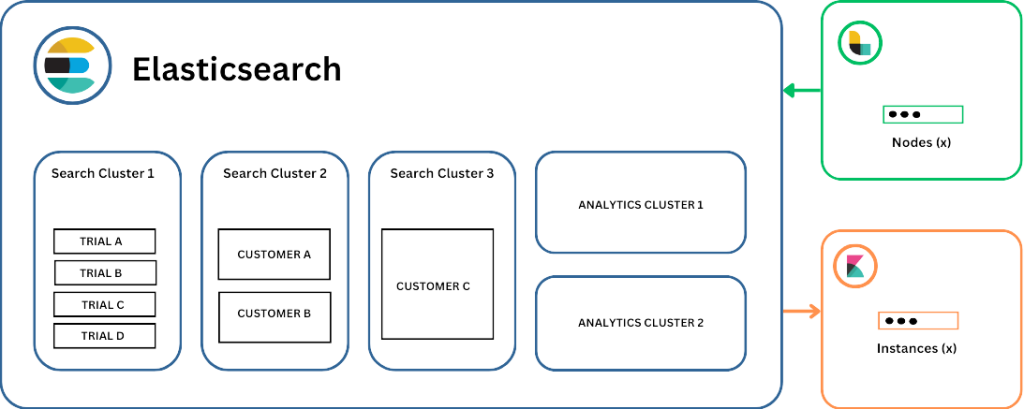
Who Should Use It?
- E-commerce businesses that need fast and precise product searches.
- Corporate websites with a vast internal knowledge base or multiple document types.
- Community forums and social platforms where users search for discussions, topics, and trends.
Example Use Case:
A large e-commerce retailer integrates ElasticSearch into their online store, allowing customers to find products with lightning speed. Advanced filters enable users to search by brand, price, availability, and more, leading to a 30% improvement in product discovery and sales.
2. Apache Solr: A Flexible and Robust Search Platform
Apache Solr is another enterprise-grade search engine known for its flexibility and deep customization capabilities. It’s an excellent option for businesses looking to fine-tune their search experiences with specific functionalities. This can handle thousands to millions of queries per second, making it perfect for large businesses.
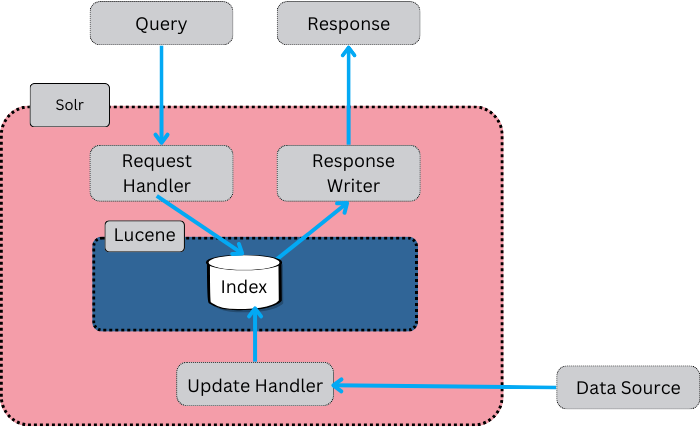
Who Should Use It?
- Corporate intranets where employees need quick access to reports, documents, and policies.
- Educational platforms where students and instructors search for courses, learning materials, and academic papers.
- News and publishing websites that require an intelligent search mechanism for thousands of articles.
Example Use Case:
A leading financial institution integrates Apache Solr into its internal database, allowing employees to search for policies, legal documents, and reports. By implementing faceted search, employees can narrow down search results based on document type, date, and regulatory updates, saving hours of research time.
3. LlamaIndex: The Key to Smarter Document Retrieval
LlamaIndex is a relatively new but powerful tool that focuses on document indexing and content retrieval. It is designed to make enterprise search smarter by leveraging AI-powered query handling. This converts unstructured data (PDFs, reports, emails) into structured, searchable content.
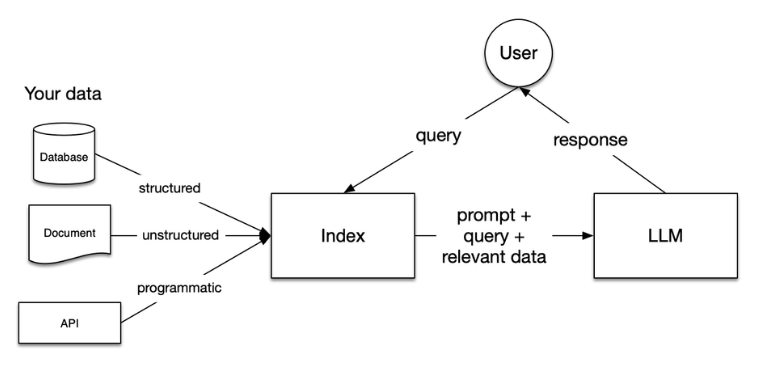
Who Should Use It?
- Corporate businesses dealing with large volumes of reports, contracts, and meeting transcripts.
- Legal firms that need to retrieve case files, court documents, and client records.
- Medical institutions that require easy access to research papers, patient records, and clinical reports.
Example Use Case:
A law firm uses LlamaIndex to manage thousands of legal case files. Instead of sifting through manual folders, lawyers can type in queries like “Show me all contracts signed in 2022 that include a non-compete clause.” The system retrieves relevant documents instantly, improving efficiency and reducing research time.
4. AI & Machine Learning: The Future of Search Optimization
AI and Machine Learning (ML) are revolutionizing search experiences by making them context-aware, personalized, and predictive. Businesses can use AI to understand user intent better and continuously refine search results. This most importantly allows users to phrase their searches in everyday language with Natural Language Processing (NLP).
Who Should Use It?
- Retail & e-commerce companies looking to improve product discoverability.
- Media & entertainment platforms that need personalized content recommendations.
- Customer support centers that rely on chatbot-driven knowledge bases.
Example Use Case:
A travel booking website uses AI-powered search to suggest hotels, flights, and packages based on a user’s past bookings and preferences. If a traveler frequently searches for “beach resorts in Florida,” the search system prioritizes similar destinations, leading to higher engagement and increased conversions.
5. Knowledge Graphs: Connecting the Dots Between Data
A Knowledge Graph is a database that connects relationships between different pieces of information. This tool helps businesses understand complex queries and return more relevant search results. This tool understands the relationship between different data points and so offers context-aware search results.

Who Should Use It?
- Healthcare organizations that need to connect patient records, research, and treatment plans.
- Financial services that analyze customer data for risk assessment and fraud detection.
- Tech companies building AI-powered applications that require knowledge mapping.
Example Use Case:
A healthcare provider integrates a Knowledge Graph to link patient history, treatment data, and medical research. This allows doctors to search for related conditions, recommended treatments, and historical patient data more effectively.
How to Choose the Right Enterprise Search Technology?
Not every business needs the same search technology. Here’s how to decide which one is best for your needs:
- If you need fast and scalable search, ElasticSearch is a great choice.
- If you require high customization and advanced filtering, Apache Solr is ideal.
- If your company deals with large amounts of documents, LlamaIndex will improve document retrieval.
- If you want AI-powered, predictive search, integrate machine learning and NLP.
- If your business requires complex data relationships, use a Knowledge Graph.
By selecting the right tools for your business, you can implement enterprise search optimization effectively, leading to improved efficiency, smarter decision-making, and a better user experience.
Investing in enterprise search engine optimization firms to implement these technologies can give businesses a competitive advantage, leading to higher efficiency, increased revenue, and better decision-making. With the right approach, search optimization isn’t just an upgrade — it’s a game-changer for business success.
Flowrec Solutions: The Best Partner for Your Enterprise Search Success
When it comes to enterprise search optimization, Flowrec Solutions has the expertise to help you improve your search strategies. Whether you need consulting, custom development, or full integration of enterprise search tools, we’ve got you covered.
- Expertise in Tailored Solutions: We design custom search strategies for businesses in various industries, ensuring you get the right tools for your unique needs.
- Comprehensive Service Offering: From the initial strategy to full-scale implementation, we support you every step of the way.
- Proven Success: Our team has worked with businesses of all sizes to improve their search functionality and achieve better ROI.
With Flowrec Solutions, you can rest assured that your search systems will be optimized for maximum efficiency and effectiveness. Get in touch with us for more guide and consultation.
Conclusion: The Road Ahead for Search Optimization
Optimizing your enterprise search is one of the best investments you can make for your business. Whether you’re looking to boost sales, improve decision-making, or simply save time, enterprise search optimization will play a crucial role in your success. Start small, assess your current systems, and consider working with experts to help streamline your search processes. Your business — and your bottom line — will thank you.

